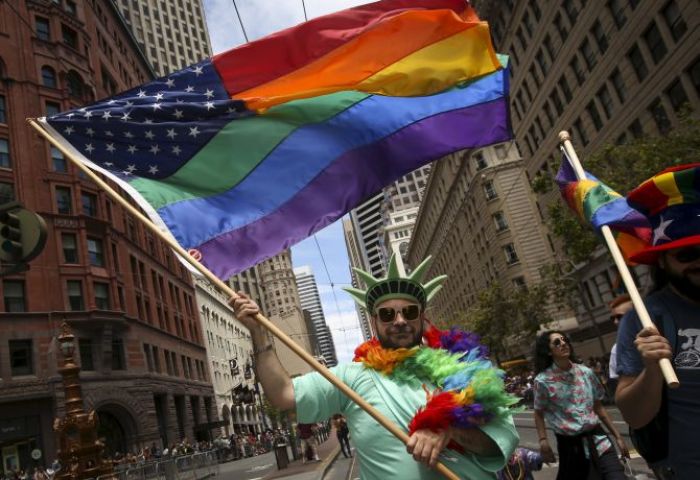Equinix ignoring concerns of religious investors by promoting Equality Act: Inspire Investing CEO

Equinix has been accused of ignoring the concerns of religious employees and investors regarding the prominent internet data company's support for the Equality Act, legislation that seeks to codify discrimination protections for the LGBT community into federal law.
If passed by Congress, the Equality Act would add gender identity and sexual orientation to federal civil rights law. Critics claim the bill would, among other things, threaten religious groups and employers who morally object to homosexuality and transgender ideology.
Inspire Investing CEO Robert Netzly, who has previously called for companies to renounce their support of the Equality Act, told The Christian Post about a recent phone conversation he had with Katrina Rymill, vice president of Investor Relations and Sustainability at Equinix.
Netzly contacted Equinix to voice concerns about the company being part of the "Business Coalition for the Equality Act" sponsored by the LGBT lobbying group Human Rights Campaign.
"We regularly reach out to companies to discuss issues of concern and share the perspective of faith-based investors with corporate executives with the objective of inspiring transformation in the policies and practices of these businesses to respect biblical values and the viewpoints of their faith-based investors and other constituents," he told CP.
Inspire Investing provides Christian financial advisors, claims to be the world's largest faith-based ETF provider and also offers a service to screen users' investing portfolios to ensure they are consistent with biblical values.
"We wanted to hear from Equinix what their motivations were for joining the Business Coalition for the Equality Act, who at Equinix was ultimately responsible for signing the company's name to the Coalition, and what input Equinix solicited and received from their faith-based employees regarding the detrimental effects that the Equality Act would have on their free exercise of religious beliefs in the workplace and beyond."
Netzly told CP that his conversation with Rymill "surfaced several concerns regarding Equinix's corporate attitude toward their religious employees."
"When I asked Ms. Rymill directly, she answered that Equinix is 'not concerned' about the Equality Act's detrimental impacts for their religious employees, including such possibilities as religious discrimination in hiring and firing decisions, shutting down of their faith-based employee resource group, and workplace hostility toward religious viewpoints about gender, sexuality and marriage," continued Netzly.
"Ms. Rymill's attitude toward me personally on the phone was overtly cold and combative. It was clear from our conversation that as the VP of Investor Relations and Sustainability, she had no desire to entertain the viewpoints or concerns of Equinix's religious investors, employees or other stakeholders."
Based on his phone conversation, Netzly believes Equinix "gives the cold shoulder to their religious stakeholders when we express our concern for the Equality Act's damaging consequences for our cherished religious freedoms in the workplace and society at large."
The Inspire Investing head recommended that Equinix do a better job of listening to the "real concerns of their religious investors and employees regarding how the Equality Act would negatively impact their day-to-day life."
"If Equinix decides to continue their support of the Equality Act, in the spirit of inclusivity and giving all employees a voice, they should also support alternative legislation and initiatives that represent the viewpoints of their investors and employees who have different opinions on the Equality Act," add Netzly.
CP reached out to Equinix for a response to Netzly's allegations. A company spokesperson said in a statement that the company strives for the inclusion of all employees.
"Since Charles Meyers became CEO three years ago, one of our signature initiatives has been creating a culture where every employee, every day, can truly say 'I'm safe, I belong and I matter,'" the statement reads.
"Our Equinix Employee Connection Networks (EECNs) play an important role in advocating for the needs and goals of communities with common identities, cultures or backgrounds. One of our EECNs, FaithConnect, strives to inspire a culture of learning and respect for all faiths, non-faiths and worldviews in the workplace."
In February, the U.S. House of Representatives passed the Equality Act in a vote of 224-206, having previously passed the bill in 2019 only to have it stall in the U.S. Senate.
Democrat Speaker of the House Nancy Pelosi of California strongly supported the legislation, saying in a floor speech that she believes the Equality Act was "sadly necessary."
"Many members of the national LGBTQ community live in states where, though they have the right to marry, they have no state-level non-discrimination protections in other areas of life," stated Pelosi.
"In more than 20 states … LGBTQ Americans do not have specific protections against being denied housing because of their sexual orientation or gender identity, and over 30 states lack protections regarding access to education. And nearly 40 states lack protections regarding jury service."
Republican Congresswoman Vicki Hartzler of Missouri denounced the Equality Act as an attack on religious freedom, parental rights and women's sports.
Hartzler, a former track coach, claimed at a virtual event in February that if the bill is passed, "we won't have women's sports that are fair." She called the legislation the "Inequality Act."
Others have called for lawmakers to take up a vote on compromise legislation called The Fairness for All Act, arguing that the Equality Act "would remove many of the basic rights that allow religious organizations to operate according to the tenets of their faith."
The Fairness for All Act, described by supports as a "product of the faith community and LGBT community coming together and challenging themselves to find ways to co-exist and to promote tolerance," would enshrine LGBT protections into federal civil rights law and include protections for religious organizations and individuals.





























